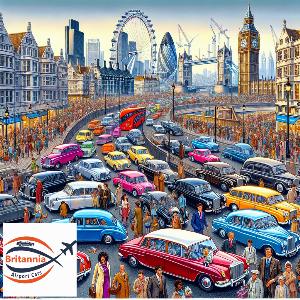A Minicab Tour of Britains Scientific Discoveries and Innovations

Isaac Newton's Discoveries
Isaac Newton, one of Britain's most influential scientists, made groundbreaking discoveries that revolutionized the world of science. A transfer tour of Britain's scientific discoveries would be incomplete without a visit to his birthplace, Woolsthorpe Manor in Lincolnshire. Here, Newton formulated his laws of motion and universal gravitation, forever changing our understanding of the physical world. His work on light and optics, particularly his discovery that white light is composed of a spectrum of colors, is another significant contribution. Newton's innovative work in mathematics, specifically the development of calculus, is also noteworthy. His discoveries laid the foundation for much of the modern scientific and technological advancements we see today. A tour of Newton's life and work offers a fascinating insight into the mind of a scientific genius and the birthplace of some of the most important discoveries in the history of science.
Charles Darwin's Theory of Evolution
Charles Darwin's Theory of Evolution is a cornerstone of modern biology, making a visit to his home, Down House, in Kent, a must-see on any transfer tour of Britain's scientific discoveries. It was here that Darwin developed his groundbreaking theory, fundamentally changing our understanding of the natural world. Darwin proposed that all species of life have descended over time from common ancestors, a process driven by natural selection. This theory, published in his 1859 book "On the Origin of Species", sparked a scientific revolution. Today, Down House stands as a testament to Darwin's genius, with exhibits showcasing his study, the gardens where he conducted experiments, and the walking path where he pondered his ideas. A visit to this historic site offers a fascinating insight into the life and work of one of Britain's most influential scientists, making it an essential stop on any tour of the country's scientific heritage.
Alexander Fleming's Penicillin
Alexander Fleming's discovery of penicillin in 1928 is one of Britain's most significant scientific breakthroughs. This monumental discovery took place at St. Mary's Hospital in London, a must-visit stop on any transfer tour of Britain's scientific landmarks. Fleming, a Scottish bacteriologist, stumbled upon the world's first antibiotic when he noticed a mould, Penicillium notatum, had contaminated one of his petri dishes and killed the surrounding bacteria. This accidental discovery revolutionized medicine, saving countless lives by effectively treating bacterial infections. Today, Fleming's laboratory has been preserved as a museum, where visitors can learn about his life, work, and the profound impact of his discovery. The discovery of penicillin is a testament to Britain's rich history of scientific innovation and a reminder of the potential for groundbreaking discoveries in the most unexpected places.
James Watson and Francis Crick's DNA Structure
Embark on a transfer tour of Britain's scientific discoveries and innovations, and you'll inevitably encounter the groundbreaking work of James Watson and Francis Crick. In 1953, this dynamic duo unveiled the double helix structure of DNA, a discovery that revolutionized the field of genetics. Their research, conducted at the University of Cambridge, revealed that DNA molecules are composed of two strands, coiled around each other in a 'twisted ladder' formation. This structure, they proposed, allowed DNA to carry genetic information from one generation to the next. Watson and Crick's discovery was a pivotal moment in science, laying the foundation for modern genetics and biotechnology. It earned them the Nobel Prize in Physiology or Medicine in 1962. As you journey through Britain's scientific landscape, their legacy serves as a reminder of the nation's rich history of innovation and discovery.
Stephen Hawking's Black Hole Theory
Stephen Hawking, one of Britain's most renowned theoretical physicists, made significant contributions to the understanding of black holes, a key stop on our transfer tour of Britain's scientific discoveries and innovations. Hawking's black hole theory, formulated in the 1970s, revolutionized the way we perceive these cosmic phenomena. He proposed that contrary to the prevailing belief, black holes are not completely black but emit small amounts of thermal radiation, now known as 'Hawking Radiation'. This groundbreaking theory challenged the traditional laws of physics, merging quantum mechanics and general relativity. Hawking's work on black holes has had profound implications on our understanding of the universe, making it a must-visit topic on our scientific journey. As we explore Britain's rich scientific history, Hawking's black hole theory stands as a testament to the nation's spirit of innovation and discovery.
Tim Berners-Lee's World Wide Web
In the realm of Britain's scientific discoveries and innovations, one name stands out: Sir Tim Berners-Lee, the inventor of the World Wide Web. Born in London in 1955, Berners-Lee revolutionized the way we communicate, work, and live. His invention, conceived and implemented in 1989 while working at CERN, the European physics research center, has transformed the world into a global village. The World Wide Web, distinct from the internet, is a system of interlinked hypertext documents accessed via the internet. It has democratized access to information, breaking down geographical and social barriers. Today, it's hard to imagine a world without the web, from online shopping and social media to digital banking and remote working. As you journey through Britain, remember that this small island nation has been a cradle of monumental scientific innovations, with Tim Berners-Lee's World Wide Web being one of the most impactful.
Alan Turing's Computing Innovations
Alan Turing, a British mathematician and logician, is widely recognized as the father of modern computing. His groundbreaking work during the 20th century laid the foundation for the digital age we live in today. Turing's most notable innovation was the concept of a 'universal machine' that could simulate any other machine's computations. This idea was the precursor to the modern computer. Turing also played a pivotal role in World War II, where he developed the Bombe machine to crack the German Enigma code, significantly contributing to the Allied victory. His work in artificial intelligence, particularly the 'Turing Test', continues to influence the field today. Turing's life and work are commemorated at Bletchley Park, where he worked during the war, and is a must-visit location on any tour of Britain's scientific discoveries and innovations. Despite his tragic end, Turing's legacy continues to inspire and drive technological advancements worldwide.
Rosalind Franklin's X-ray Diffraction
Rosalind Franklin's groundbreaking work in X-ray diffraction, a key discovery in the field of molecular biology, is a must-visit stop on any transfer tour of Britain's scientific innovations. Franklin, a British scientist, used X-ray diffraction techniques to capture the first clear image of DNA's structure, known as Photo 51. This image was instrumental in the discovery of the DNA double helix structure by James Watson and Francis Crick. Franklin's work, conducted at King's College London in the early 1950s, revolutionized our understanding of genetics and paved the way for numerous advancements in biology and medicine. Despite her significant contributions, Franklin's role was largely overlooked until after her death. Today, her pioneering work is recognized and celebrated as a cornerstone of molecular biology. A visit to King's College offers a glimpse into the world of this unsung heroine of science and her remarkable discovery.
Michael Faraday's Electromagnetic Discoveries
Michael Faraday, a renowned British scientist, made groundbreaking discoveries in the field of electromagnetism that revolutionized the world of science. Born in 1791, Faraday's humble beginnings did not hinder his insatiable curiosity and passion for science. His most significant contribution was the discovery of electromagnetic induction in 1831, which led to the development of the electric generator. This discovery was a monumental leap in the understanding of how electricity works, paving the way for the widespread use of electricity that we see today. Faraday's experiments also led to the establishment of the laws of electrolysis, further cementing his legacy in the field of electromagnetism. His work has had a profound impact on various fields, from physics to chemistry, and continues to inspire scientists today. A tour of Britain's scientific discoveries would be incomplete without acknowledging Faraday's invaluable contributions to the world of science.
Joseph Priestley's Discovery of Oxygen
Joseph Priestley, a renowned 18th-century English chemist, theologian, and educator, made a groundbreaking discovery that significantly shaped our understanding of the natural world. During a transfer tour of Britain's scientific discoveries, one cannot miss the significance of Priestley's discovery of oxygen in 1774. This monumental finding took place in his laboratory in Wiltshire, where he isolated a gas that he initially referred to as 'dephlogisticated air'. Priestley's experiments revealed that this gas was a separate entity, not merely a component of air as previously believed. This gas was later named 'oxygen' by French chemist Antoine Lavoisier. Priestley's discovery of oxygen not only revolutionized the field of chemistry but also paved the way for further understanding of human respiration and combustion processes. Today, his contribution stands as a testament to Britain's rich history of scientific innovation and discovery.
Our Latest Blog Posts

Minicab Journeys Through Britains Stunning Valley Landscapes
Blog about transfer Journeys Through Britains Stunning Valley Landscapes
Read More
Exploring Britains Vineyards: Minicab Trips from London Airports
Blog about Exploring Britains Vineyards: transfer Trips from London Airports
Read More
Minicab Adventures to the Scottish Highlands: A Trip to Remember
Blog about transfer Adventures to the Scottish Highlands: A Trip to Remember
Read More
A Minicab Ride to the Heart of Britains Agricultural Heritage
Blog about A transfer Ride to the Heart of Britains Agricultural Heritage
Read More
Minicab Rides to Britains Historic Railway Viaducts and Tunnels
Blog about transfer Rides to Britains Historic Railway Viaducts and Tunnels
Read More
A Minicab Ride Along Britains Iconic Coastlines and Cliffs
Blog about A transfer Ride Along Britains Iconic Coastlines and Cliffs
Read More
Art and Culture Minicab Tours: From London Airports to Galleries
Blog about Art and Culture transfer Tours: From London Airports to Galleries
Read More
Exploring the Diversity of Britains Urban Landscapes by Minicab
Blog about Exploring the Diversity of Britains Urban Landscapes by transfer
Read More
Exploring Britains Historic Dockyards and Maritime Museums by Minicab
Blog about Exploring Britains Historic Dockyards and Maritime Museums by transfer
Read More
Minicab Rides to the Gateways of the British Isles: Exploring Ferry Ports
Blog about transfer Rides to the Gateways of the British Isles: Exploring Ferry Ports
Read More
Minicab Trips to Britains Most Scenic and Challenging Golf Courses
Blog about transfer Trips to Britains Most Scenic and Challenging Golf Courses
Read More
Minicab Journeys to Britains Iconic Victorian Engineering Marvels
Blog about transfer Journeys to Britains Iconic Victorian Engineering Marvels
Read More
Discovering Britains Green Spaces: Minicab Trips to Urban Parks and Gardens
Blog about Discovering Britains Green Spaces: transfer Trips to Urban Parks and Gardens
Read More
From London to the Legends: Minicab Trips to Britains Mythical and Folklore Sites
Blog about From London to the Legends: transfer Trips to Britains Mythical and Folklore Sites
Read More
Minicab Rides to the Best of Britains Traditional Seaside Towns
Blog about transfer Rides to the Best of Britains Traditional Seaside Towns
Read More
Minicab Trips to the Heart of Britains Folk Music Scene
Blog about transfer Trips to the Heart of Britains Folk Music Scene
Read MoreBlogs Pages
City to Sea: Minicab Journeys from London to Britains Beaches

Blog about City to Sea: transfer Journeys from London to Britains Beaches...
Read MoreMinicab Rides to Discover Britains Rich Maritime Traditions

Blog about transfer Rides to Discover Britains Rich Maritime Traditions...
Read MoreCountryside to Capital: Seamless Minicab Minicabs from Rural Areas to London

Blog about Countryside to Capital: Seamless transfer Transfers from Rural Areas to London...
Read MoreSeamless Minicab Minicabs: From Londons Hustle to Coastal Calm

Blog about Seamless transfer Transfers: From Londons Hustle to Coastal Calm...
Read MoreFrom London to the Moors: A Minicab Journey to Britains Wild Landscapes

Blog about From London to the Moors: A transfer Journey to Britains Wild Landscapes...
Read MoreMinicab Expeditions to Britains Remote Islands and Coastal Retreats

Blog about transfer Expeditions to Britains Remote Islands and Coastal Retreats...
Read MoreExploring Britains Roman Legacy: Minicab Routes to Ancient Sites

Blog about Exploring Britains Roman Legacy: transfer Routes to Ancient Sites...
Read MoreMinicab Rides to the Heart of Britains Contemporary Art Scene

Blog about transfer Rides to the Heart of Britains Contemporary Art Scene...
Read MoreFrom Cityscape to Seascape: Minicab Adventures to the British Seaside

Blog about From Cityscape to Seascape: transfer Adventures to the British Seaside...
Read MoreFrom London Airports to the Highlands: A Minicab Adventure to Scotland

Blog about From London Airports to the Highlands: A transfer Adventure to Scotland...
Read More
